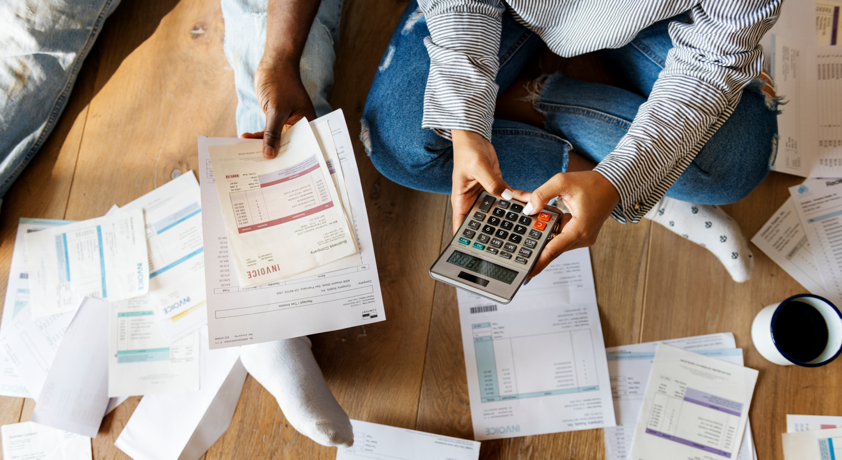How to Get Out and Stay Out of Debt

Debt can make you feel like you are constantly looking over your shoulder. It can take the joy out of the best occasions and trigger sleepless nights, anxiety attacks, and high levels of stress. Unfortunately, according to Northwestern Mutual’s 2018 Planning & Progress Study, the average American adult had an estimated $38,000 in personal debt, excluding any debt incurred from home mortgages. Whether you are only a few thousand dollars in debt or tens of thousands, there are a few tactics that you can employ to get and stay out of debt.
Let’s Talk Credit Cards and Outstanding Balances
Credit cards are notorious for promoting a “buy now, pay later” mentality that makes people acquire far more debt than they mean to. If you want to get out of debt, then a good rule of thumb is to only make a purchase “with plastic” if you have the cash to pay for it. In other words, if you can’t go to your bank and withdraw the cash needed to make the purchase, then you should think twice before you swipe your credit card.
In addition to managing your credit card balances based on the cash that you have readily available, you should also create self-imposed credit limits. The best part about keeping your credit use low is that you can simultaneously bolster your credit score. In part, your credit score is based on your credit utilization ratio, which is calculated by comparing the number of credit lines that you have used versus the amount of credit that is available. Keeping a low credit utilization ratio can not only bolster your credit score, but it will also make you more mindful of your spending habits, which of course will help you to stick to the budget you need to get out of debt.
Explore the Possibility of Debt Consolidation
Debt consolidation is a multi-step proactive approach that is especially helpful if you have acquired debt across a multitude of avenues, such as student loans, credit cards, personal loans, etc. The basis of debt consolidation is that it takes your high-interest rates and consolidates them into a single entity that has lower payments and lowers interest charges. You can implement debt consolidation on your own, or use a debt consolidation service that does not charge excessive fees, is highly rated by the Better Business Bureau, and is a non-profit.
The Federal Trade Commission’s Guide to Choosing a Credit Counselor can provide valuable insights into choosing the right consolidation loan, as well as the right debt consolidation counselor. There is one warning that should be heeded … be wary of debt settlement companies. The latter organizations work directly with creditors to negotiate what seems like attractive terms on your behalf. The challenge is that many debt settlement companies have expensive fees and can actually make a bad situation worse by leaving you in even greater debt. As a general rule of thumb, if it sounds too good to be true, then it usually is.
Stay out of Debt by Creating a Rainy Day Fund
Did you know that more than 50 percent of Americans haven’t saved $500 to cover any type of emergency expense? Unfortunately, a lack of emergency funds, also known as a rainy day fund, is one of the primary reasons that American adults end up in debt. Once you have dug your way out of debt, you should immediately begin contributing to a savings account. Over time, you should build up your emergency rainy day fund to cover up to six months of basic expenses.
Automatic payments from every paycheck are a great way to contribute to your fund. You can also eliminate an expensive habit, such as the daily $5 cup of coffee that you might purchase on your way to work every day. By eliminating the $5 cup of coffee, you can contribute an additional $100 per month to your rainy day fund. The $100 a month might not sound like a lot until you remember that it equates to $1,200 per year which is the equivalent of the estimated median average rent for a two-bedroom apartment. When you remember that your $5 cup of coffee adds up to the monthly rent, it is suddenly far easier to kick the habit to the curb in favor of making a rainy day fund contribution.
Avoid Slipping Back into Debt by Looking out for Hidden Fees
Getting out of debt is the first step toward living a healthier and more financially stable life. Slipping back into debt is easier than ever with all of the credit cards offers that will soon come your way. In fact, according to a 2015 Consumer Financial Protection Bureau Report, consumers paid more than $11 billion in non-sufficient funds, overdrafts, and other hidden fees in a 12-month period. The most common types of fees include: cash advances, balance transfers, returned payments, bounced checks, and late payments. The moral of the story is clear, if you want to avoid slipping back into debt, then you need to look out for hidden fees before you sign on the dotted line.
Get Your Student Loans in Good Standing, Especially If You Want to Pursue Higher Education
The Post-9/11 GI Bill is a great way for both active duty service members and honorably discharged veterans to return to school. However, there are a few restrictions on the bill, which might make veterans turn to student loans. If you have already acquired student loans, before taking a break from school, then you will need to complete a few tasks before you pursue a higher education opportunity.
You can get your student loans in good standing by calling your lender to discuss your desire to go back to school. You will also need to get your loan out of default by paying a certain amount over a designated period. Once your loan is back in good standing, you can discuss any additional arrangements with your lender to ensure that you have the funds you need to go back to school. With this in mind, be sure to ask your employer if they offer any monetary incentives to go back to school. You can also look for scholarships, take online courses, or look for informal modes of education, such as professional classes that can bolster your career without costing too much money.
Once Out, Stay out of Debt
In conclusion, once you are out of debt, it is important that you stay out of debt. The temptation for taking on debt can be found around every corner. To help you avoid temptation, you can keep a journal of your journey to get out of debt. Remember the hardships that you suffered and the victories that you gained by getting out of debt. Above all, remember that once you are out of debt, you will be able to find scholarships that can help you go back to school so that you can make advances in your career, achieve greater financial stability, and live your dream life.




